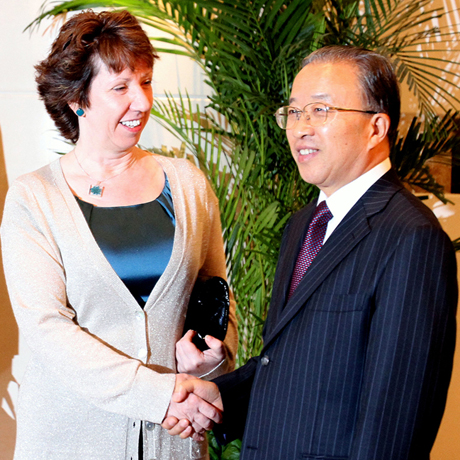China
EU's top diplomat lays groundwork
By Wu Jiao (China Daily)
Updated: 2010-09-02 12:30
 |
Large Medium Small |
|
 Catherine Ashton (left), the EU high representative for foreign affairs and security policy, and State Councilor Dai Bingguo shake hands during a high-level strategic dialogue in Guiyang, Guizhou province, on Wednesday. Jiang Dong / China Daily
|
GUIYANG - Chinese and European Union (EU) officials held a high-level strategic dialogue on Tuesday amid heightened international discussion on where China is headed after displacing Japan as world's second-biggest economy.
Catherine Ashton, the EU high representative for foreign affairs and security policy, and State Councilor Dai Bingguo co-chaired the one-day, closed-door meeting in Guiyang, capital of Southwest China's Guizhou province.
The dialogue is to outlay the foundation for the coming China-Europe Summit in October. Both sides have also further coordinated their stance ahead of a series of global governance issues, including the G20 and climate change.
Speaking from Guizhou, a relatively poor province, Ashton said that while some people only see a rich China, based on events such as 2008 Beijing Olympic Games and Shanghai Expo, the nation is one of economic contrasts.
"The EU should understand China in a comprehensive way, not only the fast developing side, but also the fact that China faces various challenges in a vital transforming period," Ashton was quoted as saying in a press release by the Chinese Foreign Ministry.
"The EU should enhance its dialogue with China economically and politically, and push forward China-EU strategic cooperating," said Ashton.
Europe's "foreign minister" also said the EU would take China's development - as the world's fastest-growing major economy - as an opportunity to work with Beijing to expand trade, investment and jobs.
She added that the EU and China should encourage personnel and cultural exchanges to enhance mutual understanding as a further way to instill grass-roots relations between China and the EU.
"China has a clear understanding of its international role and development level", Dai told his European guests, noting China's "great achievements" in the past three decades.
"China will continue to be focused on the development of its domestic society to ensure its 1.3 billion people live a decent life," Dai said, adding that China shall continue its policies of refraining from regional hegemony, while maintaining its global responsibilities.
Domestic requirements are important, too, he noted.
Indeed, that the dialogue was held in Guizhou, one of the poorest regions of China - with a per-capita GDP standing at only one-seventh of that of Shanghai - was no accident: Dai hoped his guests could experience an altogether different, less acknowledged, part of China.
Ashton, after journeying from Shanghai, spent Tuesday afternoon visiting families in the destitute Shanping village near the capital city, whose parents are working in cities, leaving only children and their elderly at home.
Ashton also spoke to inspire primary school students in the town - many of who have little chance to leave town - by citing her own story: one with origins in a humble, working-class background that would evolve into a career as a political luminary.
Many Chinese officials and analysts believe that by witnessing China's diverse aspects - many not so often seen in the Western world - EU officials will enjoy a more balanced understanding of China.
"China wants the EU to have a more objective understanding of China and its development level," said Fu Ying, the vice foreign minister who accompanied Ashton in the tour.
Ding Chun, director of Center for European Studies at Fudan University, agreed that the eclectic nature of the trip will only have beneficial effects for Sino-European ties, he told China Daily in an interview.
This round of dialogue between Europe's "foreign minister" and other officials, moreover, is expected to enhance China's EU relations in the wake of the Lisbon Treaty which, after entering into effect late last year, furthered European integration.
The previous four rounds of strategic talks were held between vice foreign ministers of China and nations heading the European Union's rotating presidency.
The Lisbon Treaty signifies a milestone in EU unity, while representing an important chapter in Sino-EU relations, according to Wang He, an expert on European economics at the Chinese Academy of Social Sciences.
Ashton's week-long visit is a sign, He noted, that the EU and Beijing have undertaken mutually "realistic" approaches to address concerns that relations have cooled in recent years, noted Jonathan Holslag, a research fellow at the Brussels Institute of Contemporary China Studies.
"It's encouraging that Ashton's visit has come after she invested a lot of time and energy among the 27 EU members to learn their expectations and concerns toward China - which is essential," said Holslag.
Ashton is expected to meet other Chinese leaders, including Premier Wen Jiabao and Foreign Minister Yang Jiechi, on Thursday.
Zhang Chunyan and Fu Jing contributed to this story.
China Daily